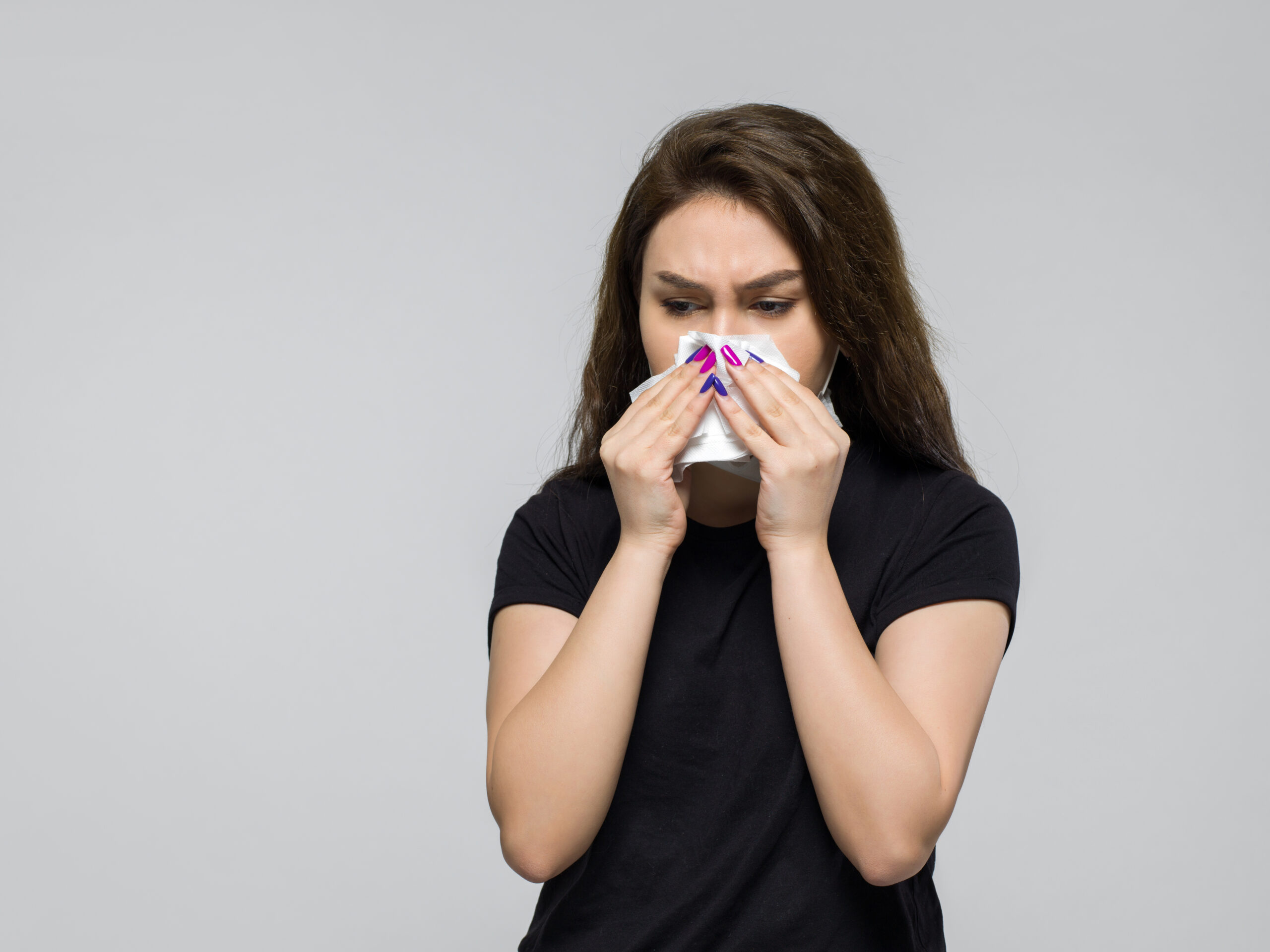Allergic Rhinitis
Home
Allergic Rhinitis
Ayurvedic Treatment for Allergic Rhinitis: Causes, Diet, Remedies & Lifestyle Practices
Allergic Rhinitis, commonly known as hay fever, is one of the most prevalent respiratory disorders affecting millions of people worldwide. It is characterized by sneezing, runny or stuffy nose, watery eyes, and irritation in the throat, usually triggered by allergens such as pollen, dust, or pet dander. While modern medicine often focuses on symptom suppression through antihistamines and nasal sprays, Ayurveda provides a holistic approach that works on the root cause—balancing the body’s doshas, improving digestion, and enhancing immunity.
Ayurvedic medicine for allergic rhinitis focuses not only on relieving symptoms but also on correcting underlying imbalances, strengthening immunity, and preventing recurrences.
In Ayurveda, Allergic Rhinitis is closely linked with Pratishyaya and Vata-Kaphaja vikara. Let’s dive deep into its causes, symptoms, diet, lifestyle changes, and Ayurvedic remedies that can help bring long-lasting relief.

Understanding Allergic Rhinitis in Ayurveda
Ayurveda describes health as a state of balance among the three fundamental energies (doshas)—Vata, Pitta, and Kapha. Allergic Rhinitis primarily arises due to an imbalance in Vata and Kapha doshas, along with weakened digestive fire (Agni), which leads to the accumulation of Ama (toxins).
- Vata imbalance causes dryness, irritation, and sneezing.
- Kapha imbalance results in mucus production, nasal congestion, and heaviness.
- Ama (toxins) block the body’s channels, lowering immunity and making the body hypersensitive to allergens.
Thus, the Ayurvedic treatment of Allergic Rhinitis is not just about relieving nasal congestion but focuses on detoxification, strengthening Agni, balancing doshas, and boosting immunity (Ojas) with the help of herbs, diet, and therapies.
Symptoms of Allergic Rhinitis (Lakshana)
- Frequent sneezing
- Clear, watery nasal discharge
- Nasal blockage and congestion
- Itchy and watery eyes
- Irritation in throat and ears
- Headache and heaviness of head
- Loss of taste and smell
- Fatigue and disturbed sleep
If left untreated, chronic allergic rhinitis may lead to sinusitis, nasal polyps, or respiratory conditions like asthma.
Ayurvedic Line of Treatment (Chikitsa Siddhanta)
Ayurveda emphasizes three main goals in treating Allergic Rhinitis:
- Shodhana (Detoxification) – Removing toxins and balancing doshas through Panchakarma therapies.
- Shamana (Pacification) – Using herbs, diet, and medicines to balance Vata and Kapha.
- Rasayana (Rejuvenation) – Strengthening immunity and preventing recurrence.
This threefold approach makes Ayurvedic medicine for allergic rhinitis more effective for long-term relief compared to conventional treatments.
Diet for Allergic Rhinitis (Ahara)
Food plays a crucial role in Ayurveda as both a cause and a cure.
Foods to Avoid:
- Cold foods and drinks, ice creams, chilled water
- Dairy products like curd, cheese, and butter (increase Kapha)
- Fried and oily foods
- Fermented foods, vinegar, and alcohol
- Excess wheat, rice, and heavy grains during cold weather
- Processed foods with preservatives
Foods to Include:
- Warm, freshly prepared light meals
- Spices – turmeric, ginger, black pepper, cumin, coriander (improve digestion and reduce mucus)
- Herbal teas – tulsi, cinnamon, and cardamom decoction for immunity
- Fruits – amla, pomegranate, papaya, and kiwi (rich in Vitamin C, act as natural antihistamines)
- Vegetables – bitter gourd, drumstick, spinach, and bottle gourd for balancing Kapha
- Legumes – moong dal and lentils (easy to digest)
- Grains – barley, millet, and old rice for lightness
Taking a spoon of Chyawanprash daily is highly recommended as an Ayurvedic remedy for allergic rhinitis to boost immunity.
Can Allergic Rhinitis Be Cured Permanently with Ayurveda?
While modern medicine focuses on temporary relief, Ayurveda aims to treat the root cause by:
- Eliminating toxins
- Strengthening digestion (Agni)
- Correcting Vata-Kapha imbalance
- Enhancing immunity
With consistent diet, lifestyle modifications, and proper use of Ayurvedic medicine for allergic rhinitis, the condition can be managed effectively and recurrences can be minimized significantly.
Ayurvedic Therapies (Panchakarma)
For chronic and severe cases, Ayurvedic physicians recommend detoxification therapies:
- Nasya Karma – Administration of medicated oil (like Anu Taila or Shadbindu Taila) into the nostrils. It clears sinus passages, strengthens nasal tissues, and prevents recurrence.
- Dhoomapana – Inhalation of medicated smoke for reducing Kapha and clearing blockages.
- Vamana Karma (Therapeutic Emesis) – Induces controlled vomiting to eliminate excess Kapha.
- Abhyanga & Swedana – Full-body oil massage followed by steam therapy to remove toxins.
- Rasayana Therapy – Strengthening immunity with rejuvenating herbs and formulations.
These Panchakarma therapies make Ayurvedic treatment for allergic rhinitis comprehensive, addressing both symptoms and root causes.
